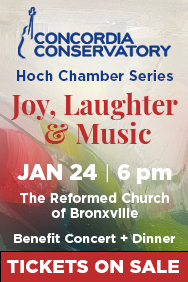From the Mayor: Westchester Municipal Officials Association Legislative Priorities for 2024

Pictured: Mayor Mary Marvin. Photo by N. Bower
By Mary Marvin, Mayor of Bronxville
Feb. 7, 2024: The Westchester Municipal Officials Association, of which I am an Executive Committee member as I find it so helpful to confer with my colleagues on issues of mutual concern, has issued its annual legislative priorities for 2024.
While we recognize that there are indeed many competing budget priorities for the Governor and the Legislature to balance, we believe a true state/local partnership is essential to the well-being of Westchester.
Housing
As you may remember, we were unified last year in opposing the one size fits all compulsory housing program that was promulgated. Rather we would support a community focused, voluntary and incentive based approach now being espoused by Governor Hochul. The new approach recognizes the importance of ensuring that municipalities can create solutions that will work locally.
Aid to Municipalities (AIM)
For the 16th consecutive year, the state budget does not increase the aid to municipalities despite expansion of the budget in virtually all other assistance programs. We are asking that a fair percentage of tax dollars that go to Albany actually come back from Albany to the taxpayers.
Civil Service
The civil service system as it is currently structured is truly the bane of hiring on the municipal level as it hinders local governments from attracting and retaining the best candidates. The current rules are arcane and illogical at best as we often have to wait months for an exam to happen, let alone receive the scores and then interview accordingly. We do support the Governor’s proposal to provide expanded use of a continuous recruitment exam cycle, but so much more needs to be done.
Government Contracts
New York State currently requires municipalities as generators of public works contracts to pay “the prevailing rate of wages.” However, the dollar threshold that triggers this provision has not been increased since 1971. In addition, the method used for calculating “the prevailing rate of wages” produces highly inflated, unrealistic wages. We seek a thorough review of the regulations and a moratorium on any expansion until all the impacts are analyzed.
Road Repair Assistance
As is quite clear, locally owned roads are in dire need of repair in communities throughout New York. We need increased funding from our state partner to repair them. However, the Consolidated Highway Improvement Program that helps close the increasing funding gap has been left at stagnant funding levels for years. Not only would an increase in funds improve the safety of our highways and bridges, it will grow the economy with jobs.
Water and Sewer Infrastructure
Again, as is quite clear to far too many of our residents, infrastructure in New York State is clearly aging, and more funding is desperately needed for water and sewer infrastructure to increase economic value and also keep the quality of life intact.
2% Tax Cap
Our group also seeks an exclusion from the tax gap for expenditures on public infrastructure - an exclusion already granted to schools and used by the state itself. The current cap rule discourages capital investment at a time when such investment is critically needed on aging infrastructure.
Design/Build Contracts
We encourage the legislature to allow design/build construction throughout the State. New York City and many state agencies including the Thruway Authority, the DOT, the Office of Parks and Recreation and the SUNY system are allowed to use design/build contracts. This cost saving method of construction should be made available to all municipalities and not just carved out exceptions.
Capitalization Rate
Since 2007, investment yields have dropped significantly across all investment classes regardless of risk. Despite this clear yield shift, the capitalization rates typically accepted by New York courts for tax certiorari cases remain in the 8 to 10% range. As a result, owners achieve assessment reductions that do not reflect market reality. We encourage that this whole funding paradigm be re-evaluated.
Gross Receipts Tax
Under current laws, cities and villages can impose a gross receipts tax (GRT) on the operating income of utility companies located within their boundaries at a rate of 1%. (Rochester, Yonkers and Buffalo are permitted to impose a 3% tax, an option not granted elsewhere in the state). The GRT is one of the few sources of non-property tax revenue available in New York State.
Laws governing this tax have not been amended to reflect changes in the technology, i.e. cell phones and should be revisited.
Fees for Services to Tax Exempt Property
The mayors’ group supports legislation that provides a local option to charge tax exempt properties for the cost of services such as police protection, fire protection, street and highway construction and maintenance of lighting, sanitary, and water systems.
MTA Maintenance Fee
What is largely unknown is that every community in Westchester pays into a $19 million tax levy for station maintenance which is then collected by the county.
Our Village pays upwards of $400,000 for the privilege of station maintenance. This legislation was established many years ago and the costs appear to exceed the likely cost of the services we receive.
Reform the Scaffold Law
We are now the only state in the union that has a scaffold law holding contractors, employers and property owners absolutely liable for gravity related injuries, even if the worker was grossly negligent. Enacted in 1885, it has never been amended and as a result, municipalities are faced with broad liability and skyrocketing insurance costs.
Government & History Directory
Bronxville is a quaint village (one square mile) located just 16 miles north of midtown Manhattan (roughly 30 minutes on the train) and has a population of approximately 6,500. It is known as a premier community with an excellent public school (K-12) and easy access to Manhattan. Bronxville offers many amenities including an attractive business district, a hospital (Lawrence Hospital), public paddle and tennis courts, fine dining at local restaurants, two private country clubs and a community library.
While the earliest settlers of Bronxville date back to the first half of the 18th century, the history of the modern suburb of Bronxville began in 1890 when William Van Duzer Lawrence purchased a farm and commissioned the architect, William A. Bates, to design a planned community of houses for well-known artists and professionals that became a thriving art colony. This community, now called Lawrence Park, is listed on the National register of Historic Places and many of the homes still have artists’ studios. A neighborhood association within Lawrence Park called “The Hilltop Association” keeps this heritage alive with art shows and other events for neighbors.
Bronxville offers many charming neighborhoods as well as a variety of living options for residents including single family homes, town houses, cooperatives and condominiums. One of the chief benefits of living in “the village” is that your children can attend the Bronxville School.
The Bronxville postal zone (10708, known as “Bronxville PO”) includes the village of Bronxville as well as the Chester Heights section of Eastchester, parts of Tuckahoe and the Lawrence Park West, Cedar Knolls, Armour Villa and Longvale sections of Yonkers. Many of these areas have their own distinct character. For instance, the Armour Villa section has many historic homes and even has its own newsletter called “The Villa Voice” which reports on neighborhood news.
Link to Village of Bronxville One Square Mile Monthly Newsletter
Village of Bronxville Administrative Offices
337-6500
Open 9:00am - 4pm excluding holidays and weekends
Bronxville Police Department
337-0500
Open 24 hours
Bronxville Parking Violations
337-2024
Open 9:00am - 4pm excluding holidays and weekends
Bronxville Fire Deparment
793-6400












